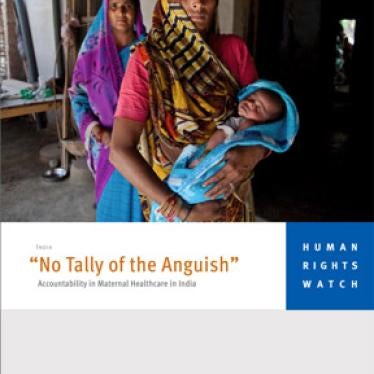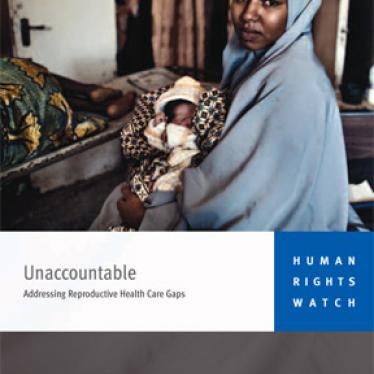World Health Organisation
Avenue Appia 20
1211 Geneva 27
Switzerland
Chairpersons President Jakaya Mrisho Kikwete and Prime Minister Stephen Harper,
The undersigned civil society organisations, working on human rights concerns relating to women's and girls' health in a range of contexts, welcome the recent establishment of the Commission on Information and Accountability for Women's and Children's Health, which will monitor achievement of the UN Secretary General's Global Strategy for Women's and Children's Health. We congratulate you on your appointment as chairpersons. We very much look forward to working with you in this capacity.
Accountability in the context of women's health is intrinsically linked to an understanding of what it means to observe human rights in the delivery of maternal healthcare. Our research and experience has shown that observance of human rights is at the core of effective maternal mortality reduction policies, and essential to equitable and sustainable progress on all MDGs, in particular Goal 3 (on gender equality and women's empowerment) and Goal 5 (on maternal health).
In this connection, we urge the Commission - in its considerations and recommendations - to reflect on the relevant provisions contained in international law and standards, including the International Covenant on Economic, Social and Cultural Rights, the International Covenant on Civil and Political Rights, the Convention on the Elimination of all Forms of Discrimination Against Women, the Convention on the Rights of the Child, and the authoritative guidance provided by the UN and regional human rights bodies, as well as the commitments governments made in the Cairo Programme of Action, the Beijing Platform for Action and the Maputo Protocol on Women's Rights in Africa. Concretely, adherence to human rights standards requires that there are effective, transparent, independent and accessible monitoring, accountability and redress mechanisms, at the national and international levels, in relation to the public and private health sectors.
Through our work we have identified a number of accountability measures that the Commission might helpfully encourage national governments to implement. These measures include:
- Monitoring of health system failures leading to maternal mortality and morbidity;
- Establishing independent grievance and redress procedures and ensuring that effective remedies are available and accessible under domestic laws;
- Promoting the improvement of birth and death registrations; and
- Having in place effective monitoring mechanisms to track progress, and ensure consistency of policies, strategies and programmes with human rights obligations.
We encourage the Commission to ensure that stakeholder consultations are conducted in an open and transparent manner, in line with the best practices followed by other Commissions of the WHO, in the process of developing their recommendations. We believe it is paramount for the Commission to allow sufficient time and space for stakeholder deliberations in order for any final recommendations to serve their purpose of aiding partners in fulfilling their obligations under the Global Strategy. The complex nature of the issue makes it doubly important for the Commission to set up structures for effective and meaningful stakeholder involvement at all stages of its work.
One key element of the accountability framework to be proposed by the Commission will be the identification of a core set of indicators for women's and children's health. To get a complete picture it is important to ensure that the health indicators are accompanied by other human rights indicators such as those indicating the processes adopted to achieve the human rights outcomes, and must be disaggregated by ethnicity, age, gender, socio-economic status, and rural/urban residence. Aggregate statistics on women's and children's health are likely to conceal lack of progress among disadvantaged and marginalised groups. Also, any body mandated to review compliance with these indicators should be independent and review all the commitments made by different actors under the Global Strategy based on a human rights framework.
We urge you, as Chairpersons of the Commission on Information and Accountability for Women's and Children's Health, to ensure that:
- Gender equality and the promotion, protection and full enjoyment of all human rights and fundamental freedoms are at the heart of the recommendations made by the Commission.
- Ensure transparency in the work of the Commission and provide opportunity for all stakeholders including civil society organisations, community-based groups and others to contribute to the discussions of the Commission.
- Data is disaggregated at least on the grounds of ethnicity, age, gender, socio-economic status, and rural/urban residence.
- Independent review of all commitments and progress made by different actors under the Global Strategy, based on a human rights framework.
We trust that these comments will assist you in developing the recommendations on accountability for women's and children's health and we look forward to contributing to future discussions around it. Please do not hesitate to contact us if you have any questions about the issues we have raised in this letter. In the meantime, we remain
Yours sincerely,
Action Canada for Population and Development
Amnesty International
Center for Reproductive Rights
Canadian Society for International Health
Human Rights Watch
International Planned Parenthood Federation
Cc:
Margaret Chan, DG WHO
Flavia Bustreo, ADG WHO
Richard Horton (Chair, WG on Accountability for Results)
Anne Mills (Chair, WG on Accountability for Resources)








